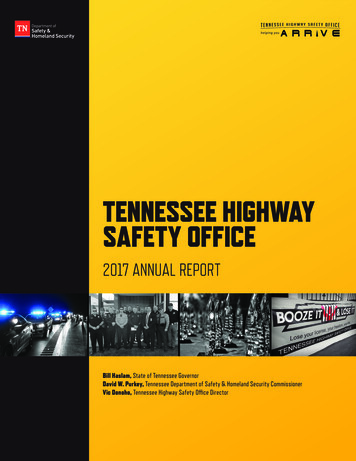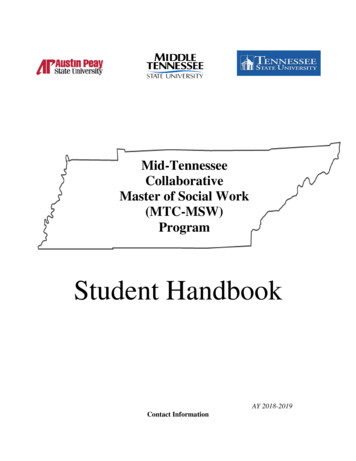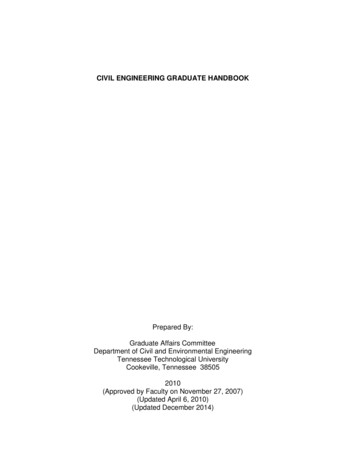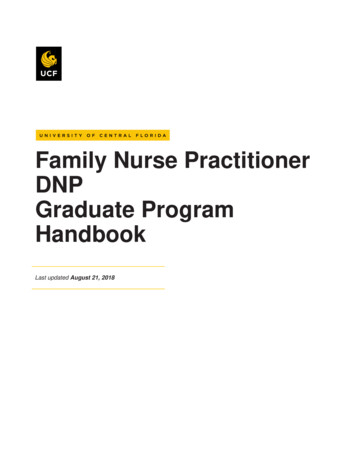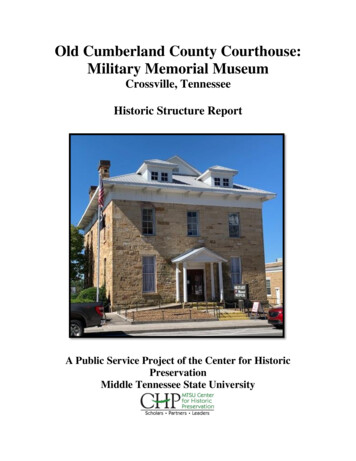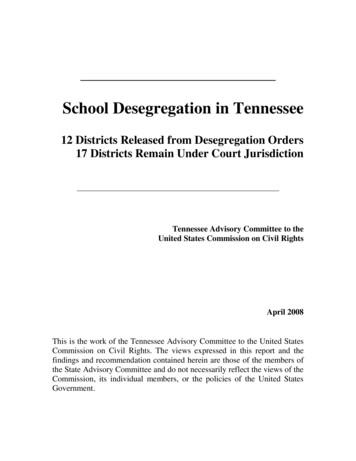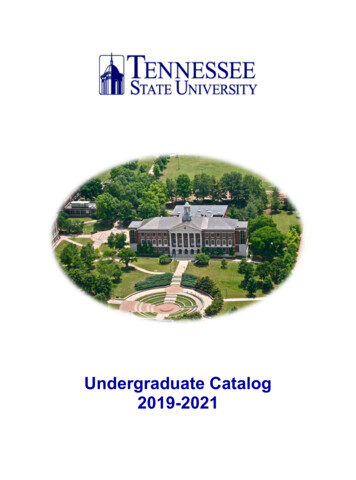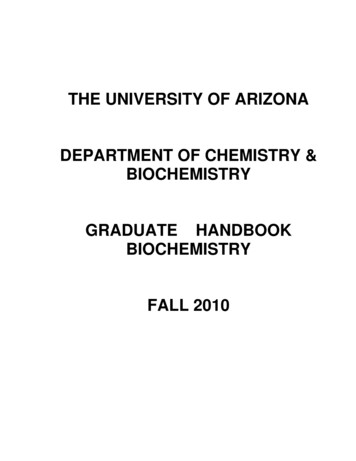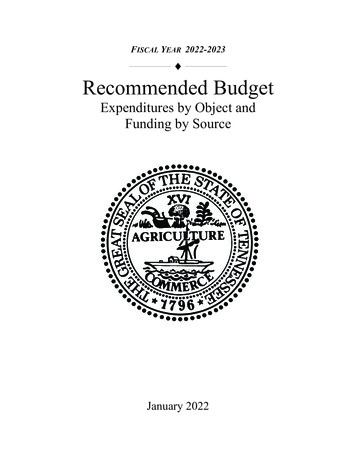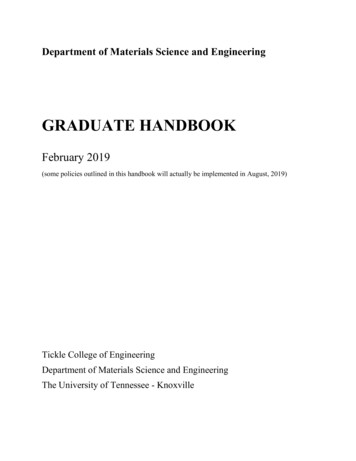
Transcription
Department of Materials Science and EngineeringGRADUATE HANDBOOKFebruary 2019(some policies outlined in this handbook will actually be implemented in August, 2019)Tickle College of EngineeringDepartment of Materials Science and EngineeringThe University of Tennessee - Knoxville
Welcome to Materials Science and Engineering.Thank you for choosing the Department of Materials Science and Engineering at The Universityof Tennessee for your graduate education. We are dedicated to providing world class facilitieswith the most recent technological developments in our field. The quality of our faculty, many ofwhich are international leaders in their fields of specialization, assures excellent opportunities foran outstanding graduate education. Our strong ties to Oak Ridge National Laboratories, as well asour involvement in many high-tech partner sites make the MSE department the premier choice forstudents wishing to develop skills that will ensure exciting careers available all over the world.We encourage you to explore this handbook, which describes all degree requirements andprocedures pertinent to the M.S. and Ph.D. degrees in Materials Science and Engineering. Pleasedo not hesitate to see your advisor or contact me or the director of graduate studies if you have anyquestions about our programs.Sincerely,Prof. Veerle KeppensDepartment Headi
TABLE OF CONTENTSSectionPage1. Introduction to the Materials Science & Engineering Graduate 1Programs at the University of Tennessee - Knoxville1.1. Background11.2. Admission Requirements and Application Procedures21.3. Financial Support, Residence Requirements and Vacation21.4. Major Professor for Graduate Students21.5. Continuous Enrollment, Credit Hours, and Course Loads31.6. Programs and Concentrations42. MSE M.S. Degree Programs52.1. MSE Thesis M.S. Degree Program52.1.1. Major professor and thesis committee52.1.2. Thesis M.S. coursework requirements52.1.3. Concentration coursework requirements for M.S. candidates62.1.4. Thesis registration and thesis62.2. MSE Non-Thesis M.S. Degree Program72.2.1. Non-thesis M.S. coursework requirements73. MSE Ph.D. Degree Program83.1. Ph.D. Faculty Advisor (Major Professor)83.2. Ph.D. Dissertation Committee83.3. Ph.D. Qualifying Examination93.4. Ph.D. Course Requirements103.4.1. Graduate course credit hour requirements for students WITHOUT a prior M.S. 10degreeii
3.4.2. Concentration course requirements (Ph.D. Candidates)113.4.3. Graduate course credit hour requirements for students WITH a prior M.S. 11degree3.5. Graduate School Requirement for “Continuous Enrollment” in Dissertation123.6. Concurrent M.S. Degree Program123.7. Dissertation Written Proposal and Dissertation Proposal Oral Examination123.7.1. Dissertation written proposal123.7.2. Dissertation proposal oral examination133.8. Admission to Candidacy133.9. Dissertation and Defense of Dissertation Examination143.9.1. Dissertation143.9.2. Defense of dissertation examination (the final oral defense)143.10. Ph.D. Time Limit144. Appeals Procedures15APPENDIX 1: MSE Faculty and Their Research Interests16APPENDIX 2: Course Lists for MSE Concentrations18APPPENDIX 3: Course Template for Ph.D. Candidate Entering MSE Directly 20from B.S. Degreeiii
1. Introduction to the Materials Science & Engineering Graduate Programs atthe University of Tennessee - Knoxville1.1. BackgroundIn order to serve the mission and vision of the Graduate School and preserve the integrity ofGraduate Programs at the University of Tennessee, Knoxville (UTK), information related to theprocess of graduate education in each department is to be provided for all graduate students. Basedon best practices offered by the Graduate Council of the Graduate School, it is important thatdetailed articulation of the information specific to the graduate degrees offered in eachdepartment/program be disseminated. This Graduate Handbook does not deviate from establishedGraduate School Policies noted in the Graduate Catalog, but rather provides the specific ways inwhich these policies are carried out. For Graduate School policies, please refer to the AcademicPolicies and Requirements for Graduate Students:http://catalog.utk.edu/content.php?catoid 25&navoid 3185#doc degree requireThe department of Materials Science and Engineering (MSE) offers graduate programs that leadto the degrees of Master of Science (M.S.) and Doctor of Philosophy (Ph.D.). These graduateprograms are flexible and interdisciplinary in nature. Students may be admitted from a wide rangeof disciplines, including physics, chemistry, chemical engineering, mechanical engineering,electrical engineering, materials engineering, nuclear engineering and engineering scienceprograms. The purpose of this handbook is to describe all degree requirements and procedurespertinent to the M.S. and Ph.D. degree programs in MSE.For general campus policies and procedures, standards of conduct, academic policies andprocedures, and information about student support, services, and organizations, please consult theHilltopics Student Handbook, the student handbook of UTK (https://hilltopics.utk.edu/). As agraduate student, you are bound by the Graduate School policies, which are listed in the GraduateCatalog (http://catalog.utk.edu/index.php - at this link, select 2018-2019 Graduate Catalog under“Please select a catalog”) and can also be found on the Graduate School website(https://gradschool.utk.edu/), together with UTK Graduate Council appeals 16/02/student-appeals-procedures.pdf/).The MSE Graduate Affairs committee oversees all issues relevant to these programs. Thecommittee consists of the following faculty members: K. Sickafus (chair), G. Duscher, Y. Gao, B.Hu, P. Liaw, D. Mandrus, T.G. Nieh, P. Rack, W. Weber, and H. Xu. Dr. Sickafus serves as theDirector of Graduate Studies for the MSE department.All faculty and graduate students in the MSE department are expected to be fully-committed tothe MSE graduate programs. All graduate students are expected to be aware of and satisfy allregulations governing their work and study at the university.1
1.2. Admission Requirements and Application ProceduresAll students who wish to pursue a graduate degree in the MSE department must first be admittedto UTK through the Graduate School. Candidates must have earned a bachelor's degree with agrade point average of at least 2.7 out of 4.0 (or a 3.0 during the senior year of undergraduatestudy), from a college or university accredited by the appropriate regional accrediting agency or aforeign equivalent (this is a Graduate Council minimum requirement). The Tickle College ofEngineering (TCE) also requires that all applicants take the Graduate Record Examination (GRE)before applying for admittance. Additionally, students whose native language is not English mustsubmit results of the Test of English as a Foreign Language (TOEFL) or other tests specified bythe Graduate Admission Office.Students wishing to apply to the MSE graduate programs must submit the UTK GraduateApplication for Admission to the Graduate School (with on-line application available plyweb.com/utg/index.ftl.The MSE Graduate Handbook (i.e., this document) includes information about the MSEDepartment, including summaries of research programs and facilities. Additional information maybe obtained by visiting the MSE Web pages (https://mse.utk.edu/).1.3. Financial Support, Residence Requirements and VacationMany graduate students in the MSE department receive financial assistance through a GraduateResearch Assistantship (GRA) or a Graduate Teaching Assistantship (GTA). All assistantships aregoverned by the Policy for the Administration of Graduate ?catoid 25&navoid 3185#poli admi grad assi). MSE GRAappointments are typically twelve-month, one-half time (50% full-time equivalent, FTE)appointments. GRAs perform duties in support of university research, which typically relatedirectly to thesis/dissertation studies. A student appointed as a GRA works under the directsupervision of his/her faculty advisor, i.e., major professor. § Research assistantships may befinanced through funds from gifts, grants, contracts, state appropriations designated for research,or UTK internally sponsored programs. Students who receive financial support are expected to bein residence throughout the calendar year pursuing full-time research and study. Typical annualvacation time is two weeks plus university holidays.1.4. Major Professor for Graduate StudentsAll GRA students are assigned a major professor. The major professor is, in most instances, theprofessor providing a particular student with financial support. Students admitted without financialsupport should report to the Director of Graduate Studies. In this case, the Director of Graduate§The Graduate School refers to the faculty advisor as the “major professor.” This said, we will refer to the facultyadvisor as the major professor throughout this document.2
Studies will review the student's background experience and advise the student on a program ofcoursework appropriate to the first year of study. A permanent advisor (i.e., a major professor whowill direct the thesis or dissertation) should be chosen before the end of the first semester (theDirector of Graduate Studies serving as the interim advisor). Students should arrange appointmentswith potential faculty advisors during the first semester, in order to learn about research projectsthat may be available. When an major professor and a research project have been agreed upon, thestudent should inform the Director of Graduate Studies of the decision. The Director will thenconfirm that the proposed major professor is willing and a formal transfer will occur. At this point,a copy of the student's file will be provided to the major professor, who will then assume alladvising responsibilities.For the M.S. program, any faculty member may serve as a faculty advisor for a student. For thePh.D. program, only faculty approved by the Graduate School for directing doctoral dissertationsare automatically acceptable. However, other faculty may apply to the Dean of the GraduateSchool for permission to direct the dissertation research of individual students. A list of potentialMSE advisors (major professors) is provided in Appendix 1 of this document.1.5. Continuous Enrollment, Credit Hours, and Course LoadsAll degree-seeking students are expected to make a full commitment to their graduate study inorder to ensure that they can complete all degree requirements without unnecessary delay.Graduate students are therefore required to maintain an active status through continuousenrollment from the time of first enrollment until graduation.Continuous enrollment is maintained by registering for a minimum of one graduate credit hour §(CH) per semester (excluding the summer). However, Ph.D. students who have started takingdissertation hours (course 600 Dissertation) must maintain a minimum of 3 CHs per semesterduring all semesters, including the summer, in order to comply with the Continuous Enrollmentrequirement.MSE 502 – Registration for Use of Facilities. This course (graded Satisfactory/No Credit) may beused to maintain continuous enrollment, in circumstances in which a student is not otherwiseregistered for coursework during a semester. Students are required to register for MSE 502 if theyare not registered for any other coursework during a semester, but are using university facilitiesand/or faculty time. This course may be repeated up to a total of 15 CHs, but these CHs may NOTbe used toward degree requirements.Special Note for International Students. The minimum enrollment for international students maybe different, and international students need to check with the Center for International Education(CIE – https://cie.utk.edu/) in order to determine what minimum enrollment they need to maintainin order to satisfy all enrollment requirements attached to their specific visa.The unit of credit is the semester credit hour. Normally, each credit hour represents an amount of instruction that is equivalent to700 minutes of classroom-based direct instruction. Credit hours earned in courses such as internships, research, theses, dissertation,etc. are based on outcome expectations established by the academic program.§3
The maximum course load for a graduate student is 15 credit hours (CHs) during fall and springsemesters. Students holding a one-half (50 percent full-time equivalent, FTE) time assistantshipnormally should enroll in at least 6 CHs during the semesters of the assistantship. However, astudent must be enrolled in at least 9 CHs to be considered full-time for federal financial aidpurposes, even if the student has an assistantship. For the summer semester, graduate studentsmay register for a maximum of 12 CHs in an entire summer semester or for a maximum of 6 CHsin a five-week summer session. Students may enroll in only one course during a mini-term session.Registration for more than 15 CHs during any semester, or for more than 12 CHs in the summersemester, is not permissible without prior approval. The major professor may request registrationof up to 18 CHs during a semester if the student has achieved a cumulative grade point average of3.60 or better in at least 9 CHs of graduate work with no outstanding incompletes. The GraduateCourse Overload form can be found on the Graduate School Forms Central page on the GraduateSchool website (https://gradschool.utk.edu/).1.6. Programs and ConcentrationsMSE offers both M.S. and Ph.D. graduate degree programs. The M.S. degree is offered throughtwo sub-programs: (1) the thesis M.S. degree; and (2) the non-thesis M.S. degree. MSE also offersthree technical areas of concentration: (1) nanomaterials (M.S. and Ph.D.); (2) automotivematerials (M.S. and Ph.D.); and (3) energy science & engineering (Ph.D. only). Detailedrequirements for the M.S. and Ph.D. programs are summarized below. MSE also offers a 5-yearB.S.-M.S. program and a Dual M.S.-M.B.A. program. Information regarding these specialprograms can be found in the UTK Graduate Catalog (http://catalog.utk.edu/index.php).4
2. MSE M.S. Degree ProgramsThe MSE M.S. degree is offered through two sub-programs: (1) the thesis M.S. degree; and (2)the non-thesis M.S. degree. These programs are described separately below.2.1. MSE Thesis M.S. Degree Program2.1.1. Major professor and thesis committeeThe MSE department requires that each M.S. student be assigned a major professor prior to theend of the first semester of study. The major professor directs the student's thesis research andchairs the thesis committee. The major professor is not required to be an MSE professor, thoughthis is usually the case. The student and the major professor must establish an M.S. thesiscommittee based on the following two guidelines:1. The committee must consist of a minimum of 3 faculty members, all of whom must havea minimum rank of Assistant Professor in the UTK system (Assistant Professor can be aResearch Assistant Professor or tenured / tenure-track Assistant Professor or an ORNLbased joint faculty member).2. Of the 3 primary committee members, a minimum of 2 members must be MSE professors.These members may have joint appointments with other UTK departments (or withORNL), but their primary academic unit appointment should be in MSE. [Exceptions tothis guideline are possible via a written petition to the Director of Graduate Affairs andsubsequent approval by the MSE Graduate Affairs Committee.]The responsibility of the M.S. thesis committee is to assist the student in planning a program ofstudy and carrying out research, and to assure fulfillment of the degree requirements. The MSEdepartment requires that the thesis committee be appointed prior to the end of the second semesterof study.2.1.2. Thesis M.S. coursework requirements30 CHs are required to earn a thesis M.S. degree in MSE.Additional requirements include:1. 9 graduate core course CHs of MSE 511, MSE 512, MSE 513, or MSE 514 are required(choose 3 of 4).2. 15 additional graduate course CHs in either MSE or related technical fields are required(students seeking an M.S. degree with a concentration should refer to Section 2.1.3. foradditional guidance). §3. 6 CHs (minimum) of MSE 500 (Thesis) are required. MSE 500 is P/NP (Pass/No Pass). §§§There is no limit to the number of CHs of MSE 576 (Special Topics in MSE) or MSE 676 (Advanced Topics inMSE) that may be applied toward graduate course CHs. Note also that any 400 level courses must be listed in theGraduate Catalog in order to receive credit.§§The Graduate School will accept up to 12 CHs of MSE 500, but only 6 of these 12 CHs will be counted towardsgraduation.5
4. 3 CHs of MSE 503 (Graduate Seminar) may be counted toward M.S. degree requirements.MSE 503 is S/NC (Satisfactory/No Credit).5. Graduate students must obtain a cumulative overall 3.0 GPA by the end of the semester inwhich they will graduate (Graduate School requirement).6. Satisfactory performance on a comprehensive oral examination administered by the facultycommittee is required.2.1.3. Concentration coursework requirements for M.S. candidatesAs mentioned in Section 1.6, students may opt to enroll in a concentration while pursuing theirM.S. degree in MSE. The following requirements apply to the three concentrations offered inMSE:1. nanomaterials: two courses (6 CHs) from the nanomaterials concentration course list arerequired. Faculty points-of-contact: Professors Gerd Duscher and Haixuan Xu.2. automotive materials: two courses (6 CHs) from the automotive materials concentrationcourse list are required. Faculty points-of-contact: Professors Yanfei Gao and T.G. Nieh.The concentration course lists mentioned above are provided in Appendix 2 of this document.2.1.4. Thesis registration and thesisA thesis M.S. student must be registered for course MSE 500 (Thesis) each semester during workon the M.S. thesis, including a minimum of 3 CHs during the semester in which the thesis isaccepted by The Graduate School. Six CHs of MSE 500 are required for the thesis option. Afterreceiving the M.S. degree, a student is no longer permitted to register for MSE 500.The thesis represents the culmination of an original research project completed by the student. Itmust be prepared according to the UTK Guide to the Preparation of Theses and Dissertations(http://web.utk.edu/ thesis/thesisresources.shtml). Two copies of the thesis must be approved andaccepted by The Graduate School on or before the deadline specified each duation-deadlines/). Each copy must include anapproval sheet, signed by the M.S. committee members, certifying that they have examined thefinal copy of the thesis and judged it to be satisfactory. Two additional copies are required by thedepartment for use as future reference documents.An M.S. candidate presenting a thesis must pass a final oral (or oral and written) examination onall work offered for the degree. The examination, which is concerned with coursework and thethesis, measures the candidate's ability to integrate material in the major and related fields,including the work presented in the thesis (this verbiage comes directly from the Graduate School).This examination, scheduled through the major professor, the committee and the MSE department,must be held at least two weeks before the final date for approval and acceptance of thesis by theGraduate School. Final examinations not properly scheduled must be repeated. The final draft ofthe thesis must be distributed to all committee members at least two weeks prior to the date of the6
final examination. In case of failure, the candidate may not apply for re-examination until thefollowing semester. The result of the second examination is final.Candidates have six calendar years from the time of enrollment in the Graduate School to completethe M.S. degree. Students who change degree programs during this six-year period may be grantedan extension after review and approval by the Graduate School. In any event, courses used towardthe M.S. degree must have been taken within six calendar years of graduation.2.2. MSE Non-Thesis M.S. Degree ProgramAny candidate may apply for a non-thesis M.S. option. Upon acceptance, a supervisory committeeof three will be appointed. At least two members of the committee will be from the faculty in themajor area (i.e., MSE). The faculty committee must approve the candidate’s degree program.2.2.1. Non-thesis M.S. coursework requirements30 CHs are required to earn a non-thesis M.S. degree in MSE.Additional requirements include:1. 9 graduate core course CHs of MSE 511, MSE 512, MSE 513, or MSE 514 are required(choose 3 of 4).2. Satisfactory completion of MSE 580 (Critical Review). MSE 580 (3 CHs) may be countedtoward the 30 CH M.S. requirement. This course must include a final presentation by theM.S. candidate to the faculty committee. The committee may also request a written report.In MSE, a comprehensive exam is NOT required. MSE 580 should be taken during thesemester in which the degree is to be awarded. MSE 580 is graded A-F.3. 3 CHs of MSE 503 (Graduate Seminar) may be counted toward M.S. degree requirements.MSE 503 is S/NC (Satisfactory/No Credit).4. Of the 30 CHs required for the M.S. degree, a minimum of 18 CHs must be in MSE (e.g.,9 CHs MSE 511,512,513,514 plus 3 CHs MSE 580 plus 3 CHs MSE 503 plus one moreMSE 3 CH graduate course). §5. Graduate students must obtain a cumulative overall 3.0 GPA by the end of the semester inwhich they will graduate (Graduate School requirement).6. Students seeking an M.S. degree with a concentration need to refer to Section 2.1.3. foradditional guidance.There is no limit to the number of CHs of MSE 576 (Special Topics in MSE) or MSE 676 (Advanced Topics inMSE) that may be applied toward graduate course CHs. Note also that any 400 level courses must be listed in theGraduate Catalog in order to receive credit.§7
3. MSE Ph.D. Degree Program3.1. Ph.D. Faculty Advisor (Major Professor)The MSE department requires that each Ph.D. student be assigned a faculty advisor (majorprofessor) prior to the end of the first semester of study. The major (advising) professor directs thestudent's dissertation research and serves as the Chair of the Ph.D. dissertation committee. Themajor professor is not required to be an MSE professor, though this is usually the case. In 2018,The Graduate School published the following requirements for Ph.D. Committee Chairs: §1. Committee chairs must hold a doctoral degree.2. UTK tenured, tenure-track, and joint faculty holding a doctoral degree may chair Ph.D.committees.3. The chair is typically from the student’s department/interdisciplinary program, butdepartment heads may make exceptions.4. UTK employees holding a non-tenure track assistant professor, associate professor orprofessor title may co-chair committees, if their appointment is within the student’s major(the other co-chair must be a UTK tenured, tenure-track or joint faculty member)5. Emeritus faculty can chair committees on which they are serving in that capacity at thetime of retirement.The MSE department has no additional requirements for major professors (Ph.D. committeechairs), other than requirements 1-5 enumerated above. If a co-chair arrangement for a particularstudent is agreed upon, then the co-chairs must (together) meet all five of the requirementsenumerated above (with one exception, namely that in MSE, one of the co-chairs can be a UTKemployee holding the title, Research Professor).3.2. Ph.D. Dissertation CommitteeThe student and the major professor are tasked with establishing a Ph.D. dissertation committee.In 2018, The Graduate School ceded Ph.D. committee requirements to the departments within theuniversity. Details of the Graduate School guidelines for Ph.D. committee service are provided mittee-form/. This link also provides guidelinesfor Ph.D. committee service. This said, there are a few principal Graduate School rules regardingPh.D. committee make-up that are summarized as follows:§1. The committee must have at least 4 members.2. At least 2 committee members must be UTK tenured or tenure-track faculty members.3. At least one committee member must be from outside of the student’sdepartment/interdisciplinary program. This external member can be from outside UTK.The Graduate School policy provides for exceptions to the above, and in the case that exceptions are needed, theMSE Department Head must petition the Dean of the Graduate School.§8
4. UTK tenured or tenure-track faculty without a doctoral degree and other experts in the fieldmay serve on Ph.D. committees with department head approval.5. Emeritus faculty can serve on committees on which they are serving in that capacity at thetime of retirement.The MSE department Ph.D. committee make-up requirements are listed below:1. The committee must consist of a minimum of 4 members.2. Of the 4 primary committee members, a minimum of 3 members must be approved by theUTK Graduate Council to direct doctoral research ouncil/).3. Of the 4 primary committee members, a minimum of 2 members must be MSE professors.These members may have joint appointments with other UTK departments (or withORNL), but their primary academic unit appointment must be in MSE.4. Of the 4 primary committee members, a minimum of 1 member must be from outside theMSE department. This external member may have a joint appointment with MSE (or anadjunct appointment with MSE). Alternatively, this external member can be from outsideUTK.[NOTE: Students are encouraged where appropriate to seek a 5th member in the field ofspecialization from outside the university to serve on their Ph.D. committee.]This Ph.D. committee is nominated by the MSE department head or TCE dean and approved bythe Graduate School.The responsibility of the Ph.D. committee is to assist the student in planning a program of studyand carrying out research, and to assure fulfillment of the degree requirements. The MSEdepartment requires that the Ph.D. committee be appointed prior to the Ph.D. “dissertationdefense.”3.3. Ph.D. Qualifying ExaminationThe MSE department requires all Ph.D. candidates to pass a Ph.D. qualifying examination. Thisexamination consists of four written exam sections (based on the four core courses in MSE; seeSection 3.4.1.). Each Ph.D. candidate is required to attempt and pass a minimum of three of thefour written exam sections. All four exam sections are offered in January of each year. Ph.D.candidates may take each exam section twice (over a two-year period), in their effort to pass theminimum three exam sections. Failing to pass three exam sections disqualifies a candidate fromcontinuing to pursue a Ph.D. in MSE. § In this circumstance, a student may consider an option tofinish their MSE graduate experience by completing an M.S. degree (this must be arranged withthe student’s major professor). All Ph.D. candidates must attempt the Ph.D. qualifier examination§A major professor may petition the Head of the MSE department for an exception to this policy.9
within 1.5 years following admission into the MSE Ph.D. program. Finally, students taking thePh.D. qualifying examinations must be in the Ph.D. program (M.S. students must enroll and beaccepted into the Ph.D. program prior to attempting the qualifiers). §3.4. Ph.D. Course RequirementsCourse requirements differ depending on whether a student proceeds directly to the MSE Ph.D.degree program from their baccalaureate degree (B.S. or B.A) or join the Ph.D. program afterearning an M.S. degree. These cases are considered individually below.3.4.1. Graduate course credit hour requirements for students WITHOUT a priorM.S. degreeFor Ph.D. candidates proceeding directly to the Ph.D. from a baccalaureate degree (B.S. or B.A),the Graduate School requires completion of a minimum of 72 CHs of study prior to graduation.The MSE department requires that a minimum of 36 CHs (of the required 72 CHs) be graduatecourse credit hours. The remaining 36 CHs may be satisfied through doctoral research anddissertation credit. Additional requirements are as follows:1. Four graduate MSE core courses, MSE 511 (crystallography), MSE 512 (mechanicalproperties), MSE 513 (thermodynamics), and MSE 514 (electronic, magnetic, opticalproperties), are required. These courses account for 12 CHs toward the required 72 CHtotal (3 CHs per class).2. A minimum of 24 additional CHs of coursework in MSE and related fields is required forgraduation. Of these 24 CHs, 12 CHs must be in MSE. A maximum of 6 CHs may be inMSE seminar - MSE 503. MSE 503 is 1 CH per semester. MSE 503 is S/NC(Satisfactory/No Credit). The 24 CHs of additional coursework may consist of anycombination of 400, §§ 500, or 600 level courses (MSE or non-MSE). §§§ Two 600-levelgraduate courses are required (this is a Graduate School requirement). These two coursesmust be in MSE (this is a department requirement). §§§§3. A minimum of 24 CHs is required in MSE 600: Doctoral Research & Dissertation (this isa Graduate School requirement). The MSE department allows students to take up to 36CHs of MSE 600 (i.e., up to half of the requisite 72 CH minimum required for graduation).MSE 600 is P/NP (Pass/No Pass).A student enrolled in the MSE M.S. degree program may transfer to the MSE Ph.D. degree program at any time (i.e.,without obtaining an M.S. degree) by submitting a Change of Program form (access this form via the reapplicationlink, graduate-school/readmission/; the reapplication fee is ½ thenormal application fee).§§Any 400-level courses must be li
pertinent to the M.S. and Ph.D. degree programs in MSE. For general campus policies and procedures, standards of conduct, academic policies and procedures, and information about student support, services, and organizations, please consult the Hilltopics Student Handbook, the student handbook of UTK (https://hilltopics.utk.edu/
